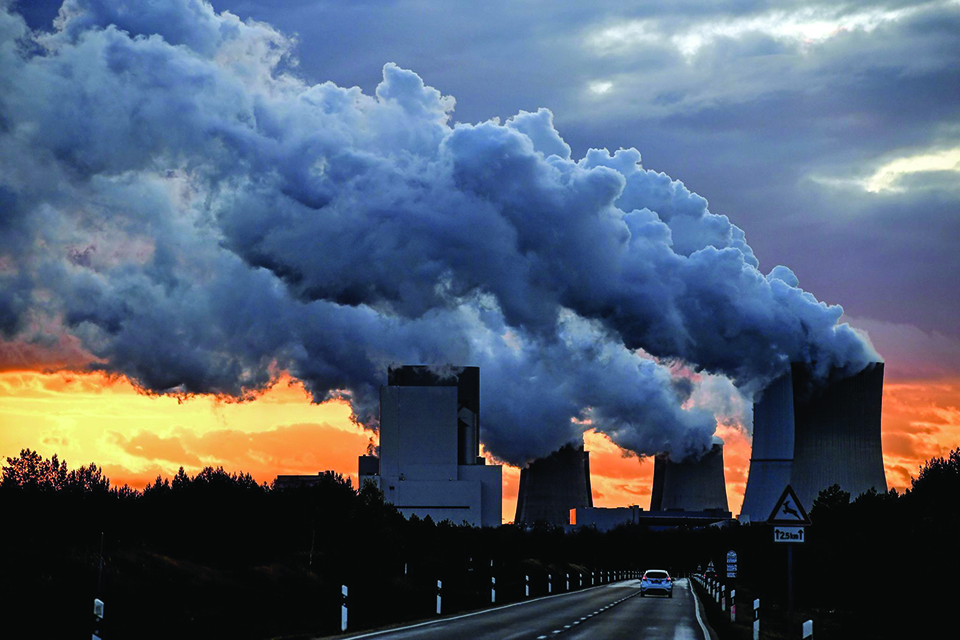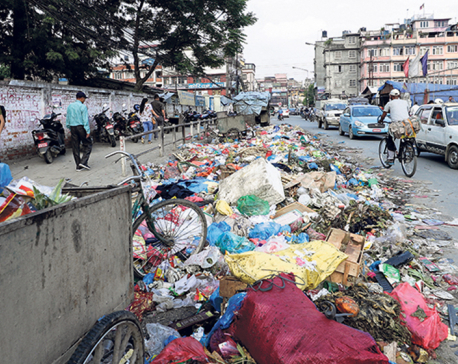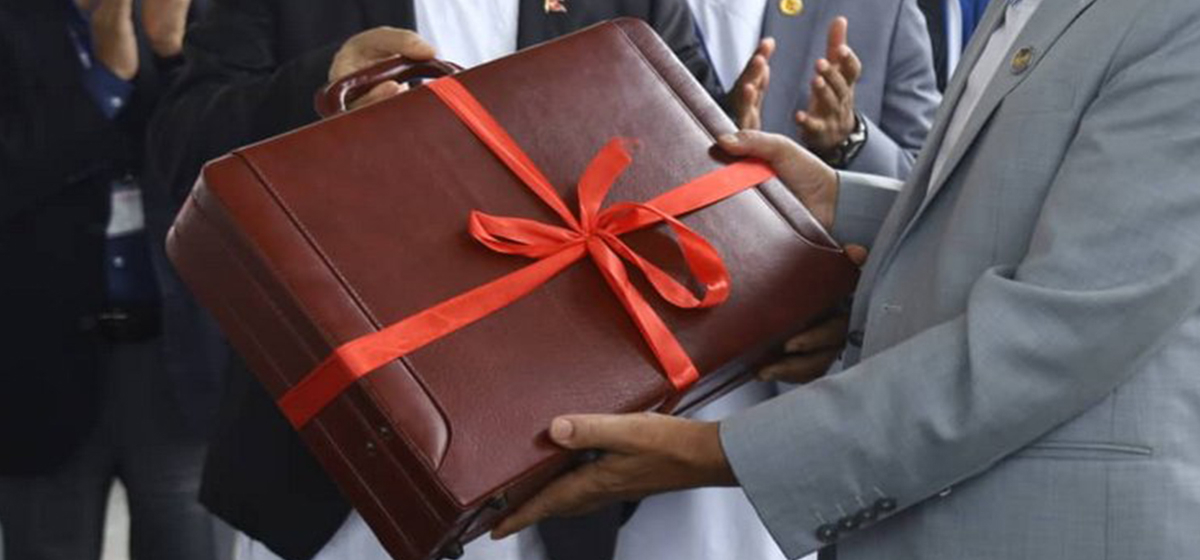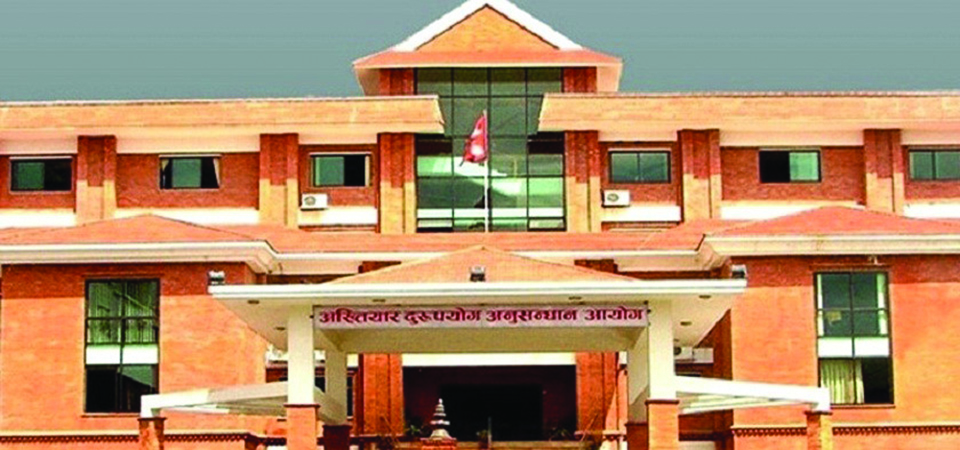
OR


Nishan Kafle
The author is a student of political science at Queens College, City University of New Yorknews@myrepublica.com
The West exalted its economy through “all means possible” approach during the industrial revolution. They need to clean up the mess they created in the process
Imagine this: you go to a restaurant for dinner with your colleagues. Everyone indulges in their gastronomic favorites. Some may have ravenous appetites while others are on a diet. In the end, a consensus is reached to split the bill. Is this fair? Certainly not for the person on diet since she eats less. This analogy fits well in the global fight against climate change. Every country—regardless of their carbon footprint—having to contribute an equal financial share to combatting climate change is tantamount to splitting a restaurant bill equally, when in fairness, it should be divided equitably.
Development is at the heart of a thriving economy. For centuries scholars have argued on the best way of attaining economic eminence by putting forward theories such as dependency, modernization, and the capabilities approaches. While all these theories are different methods on development, they all proselytize industrialization. But times have changed. With climate change being a major talking point in most international forums, priorities have shifted from development through any means possible to sustainable development.
The West has had its opportunity to enliven its economy through the “all means possible” approach during the industrial revolution and, now, the onus is on them to clean up the mess they made to get to where they are today. But developing countries, mainly India and China, have only recently reignited their economic engine and vouch for lax provisions in the global pollution-curbing campaign. While ecologically vulnerable countries like Nepal is not a significant polluter, they have the most to lose from global environmental damage.
Unfortunately, pollution doesn’t stay in the country of its origin forever (had that been the case countries would’ve certainly proscribed it). It has spillover effects. Smoke from the farmlands of northern India travel upwards to Nepal. Coastal cities of China now contribute 29 percent of the air pollution in San Francisco—across the Pacific.
Realizing that the consequences of pollution are global, the United Nations carved ambitious goals under the “2030 Agenda for Sustainable Development”. Although the report recognizes climate change as an exigent threat, climate action comes at only number 13 out of 17. It is my stance that climate action should occupy the first spot in the order of precedence since other goals such as eradicating poverty and hunger, good health and well-being, clean water and sanitation, affordable and clean energy, and sustainable cities are all, in one way or another, connected to climate change.
A drought-stricken land doesn’t produce enough grain to feed a family. So people go malnourished. This also takes a serious toll in their health—which is another SDG. Thus, all these problems are interwoven and the key to all their solutions is in climate action.
The suffering poor
The Global South is to suffer disproportionately more from climate change-induced consequences such as rising sea-levels, conspicuously scorching summers, drought, floods, and volatile weather since developing countries struggle to provide basic necessities even in normal circumstances. Couple this with feeble administrative capacity, unstable politics, and late first responders, and there’s a recipe for disaster. Developing countries are susceptible also because a majority is agriculture-based economies, meaning they rely on predictable weather patterns for their harvest and when the weather is unreliable, when water is depleted, crops are vulnerable to infestation rendering the produce worthless. More, increased temperature also harms the countries’ economic health due to decreased productivity of its workers. Low carbon economies like Nepal and Bhutan have a lot to lose in the tourism sector with melting icecaps, higher tree line, and depleting biodiversity.
The effects of climate change encompass far more than ecological damage. It has political consequences too. Residents of low-lying islands have to move inland or travel across oceans to survive rising sea-levels triggering an influx of refugees. This instigates political debate in the host country: whether to accept them or not? How to accommodate them? The world already has too much on its plate to be fighting over chauvinism and jingoism it could possibly kindle. Thus, it is in the developed worlds’ interest—and moral responsibility—to help vulnerable countries to cope with climate-induced disasters.
Prosperity-deprived citizens of developing countries should not have to choose between economic upliftment (at the expense of environmental degradation) and inhabitable world for their future generations. Sustainable development is the middle ground between these seemingly contrasting subjects. The other solution to this conundrum is developed countries—who have had their times of unhinged exploitation—extensively financing, not through soft loans, but grants, clean technologies in areas such as South Asia, Sub-Saharan Africa, and the Pacific islands to better equip vulnerable countries against the effects of untimely monsoons, droughts, erratic weather patterns, and heat waves.
Onus on the rich
As champions of research and development, it is highly convenient for developed countries to minimize the devastating effects of human-induced disasters. Although not enunciated in the Universal Declaration of Human Rights, humans have the right to better their living standards, and under no pretense should the people left behind be robbed of this right on environmental grounds. This also doesn’t mean, however, that developing countries have the luxury to run amok and take the route to development similar to that of developed nations. They should formulate and implement national plans to alleviate climate induced disasters specific to their region.
The Paris Climate Deal had pledged $100 billion each year by 2020 to mitigate the effects of climate change. But the similarities in commitments and actuality run thin with only $10.13 billion being pledged. Similarly, a report by International Monetary Fund (IMF) says low-income countries would have to increase public spending by up to 30 percent of GDP to achieve their SDGs, and commensurate amount in climate action—an untenable figure by any measure since they have more pressing issues to address.
High-income countries should aid in renewable energy production, help make plans and set attainable goals, develop new farming practices, and build resilient infrastructure.
The developed world should be in the frontline in the fight against climate change. While the calamitous impact of human errors is already being felt in the Global South, it is only a matter of time before this scourge percolates to the North with mass migration threatening the global economy triggering another great depression—this time probably an irreversible one.
The author is a student of Political Science in CUNY Queens College, New York
You May Like This

Tragedy of commons
If we work together to limit emissions of greenhouse gases, environment can be saved ... Read More...

Environmental Crisis in Kathmandu: Anarchy on Display
The planes that fly over our sky have passed their utility 10 years ago. The public buses that run in... Read More...

Away with plastics
We literally share our lives with plastic. Most of us still do not realize how bad and dangerous this could... Read More...


Just In
- JSP Central Executive Committee meeting today
- Ambassador Adhikari presents his letter of credentials to Turkish President Erdoğan
- Bajhang by-election: Construction of Taklakot Road is common election agenda of candidates
- Meeting of Finance Committee being held today to discuss 2025/25 budget
- Stakeholders call for transparency as Beijing pushes for early implementation of BRI projects in Nepal
- Special Court orders judicial custody for Sunil Paudel over illegal wealth acquisition charges
- District Court Rautahat sentences four individuals including Aftab Alam to life imprisonment
- Class 12 exam starts today with participation of over 390,000 candidates
















Leave A Comment